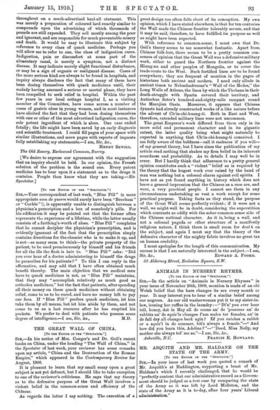THE GREAT WALL OF CHINA.
[To THE EDITOR OF THE "SPECTATOR."]
SIR,—In his notice of Mrs. Conger's and Dr. Geil's recent books on China, under the heading " The Wall of China," in the Spectator of last week, your reviewer has some remarks upon my article, " China and the Destruction of the Roman Empire," which appeared in the Contemporary Review for August, 1908.
It is pleasant to learn that my small essay upon a great subject is not yet defunct, but I should like to take exception to one of the reviewer's criticisms. He says that my theory as to the defensive purpose of the Great Wall involves a violent belief in the common-sense and efficiency of the Chinese.
As regards the latter I say nothing. The execution of a great design too often falls short of its conception. My own opinion, which I have stated elsewhere, is that for ten centuries the Wall made the Chinese frontier tolerably secure, and that it may be said, therefore, to have fulfilled its purpose as well as might have been expected.
With reference to common-sense, I must own that Dr. Geil's theory seems to me somewhat fantastic. Apart from Chinese folk-lore, there seems to be a pretty common con- sensus of opinion that the Great Wall was a defensive military work, either to guard the Northern frontier against the Hiung-nu and other peoples of Mongolia, or to cover the trade-route to the West. Such fortified lines are to be found everywhere ; they are frequent of mention in the pages of historians both ancient and modern. I need only allude in ancient times to Nebuchadrezzar's " Wall of the Medea," the Long Walls of Athens, the lines by which the Thebans in their death-struggle with Sparta covered their territory, and Antiochus Soter's hundred-and-eighty-mile rampart round the Marojian Oasis. Moreover, it appears that Chinese dynasts had already constructed works of a like nature before the advent of Chin-chi-huang-ti. Both in East and West, therefore, extended military lines were not uncommon.
The great Emperor's work differed from them only in its more solid and permanent character and in its gigantic extent, the latter quality being what might naturally be expected in anything that Ch'in-chi-huang-ti conceived. I am fully aware of the boldness—call it rashness if you will— of my general theory, but I have since the publication of my article read nothing that shakes my firm belief in its inherent soundness and probability. As to details I may well be in error. But I hardly think that adherence to a pretty general opinion constitutes such a " violent " belief as is required by the theory that the hugest work ever raised by the hand of man was nothing but a colossal charm against evil spirits. I have not as yet found anything in history which does not leave a general impression that the Chinese as a race are, and were, a very practical people. I cannot see them in any circumstances undertaking so vast a work except for some practical purpose. Taking facts as they stand, the purpose of the Great Wall seems perfectly evident; if it were not a wall, we might well be in doubt, considering the superstition which contrasts so oddly with the sober common-sense side of the Chinese national character. As it is, being a wall, and not a colossal pagoda or other structure of a manifestly religious nature, I think there is small room for doul t on the subject, and again I must say that the theory of the defensive character of the mighty fabric involves no great tax on human credulity.
I must apologise for the length of this communication. My excuse is that I am naturally interested in the subject.—I am,






































 Previous page
Previous page